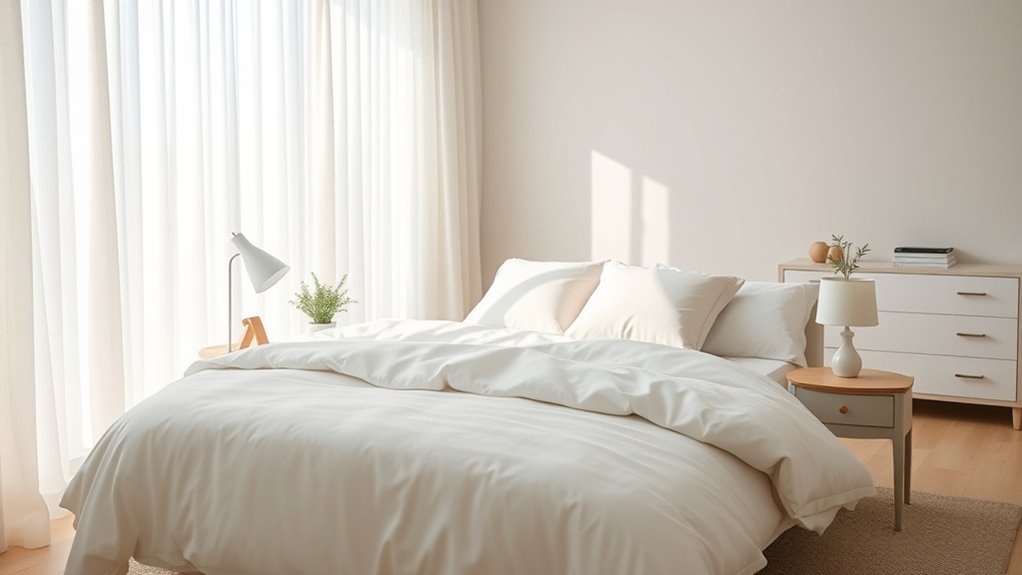Creating a clutter-free bedroom signals your brain to relax and unwind, making it easier to fall asleep. Keep your space organized with storage solutions to reduce visual stress, and choose soft, warm lighting in the evening to promote calmness. Maintain a cool, well-ventilated environment and establish a relaxing pre-sleep routine with calming activities. Prioritizing a tranquil space and consistent schedule can markedly boost your sleep quality—learn more about optimizing your nightly sanctuary now.
Key Takeaways
- Maintain a tidy, organized space to reduce mental clutter and promote relaxation before sleep.
- Use soft, warm lighting and blackout solutions to create a calming, dark environment conducive to rest.
- Keep your bedroom cool, well-ventilated, and incorporate soothing visuals or ambient sounds to enhance sleep quality.
- Establish a consistent pre-sleep routine with relaxation techniques like deep breathing or gentle stretching.
- Designate your bedroom as a tranquil sanctuary, free of unnecessary items, to reinforce restful sleep habits.

Creating a bedroom that promotes relaxation and comfort isn’t just a luxury—it’s essential for your well-being. Your sleep environment plays a critical role in how easily you wind down and drift off each night. When your space feels calm, organized, and inviting, it signals to your brain that it’s time to relax. Start by decluttering your bedroom, removing unnecessary items that distract or cause stress. A tidy room helps reduce mental clutter, making it easier to settle into restful sleep. Consider investing in storage solutions that keep your belongings out of sight, creating a serene atmosphere free of visual chaos.
A tidy, clutter-free bedroom fosters calm and signals your mind to relax for better sleep.
Lighting is also indispensable in shaping your sleep environment. Opt for soft, warm lights in the evening to foster a sense of calm. Avoid bright, blue-toned lighting close to bedtime, as it can interfere with melatonin production—the hormone responsible for regulating sleep. Blackout curtains or an eye mask can block out unwanted light, ensuring darkness that promotes deeper rest. Temperature matters, too. Keep your bedroom cool and well-ventilated, ideally between 60-67°F (15-19°C), to help your body maintain its natural sleep cycle. Additionally, high-quality projectors can be used to create a calming ambient environment, such as projecting soothing visuals or relaxing videos, which can enhance your pre-sleep routine.
In addition to optimizing your sleep environment, incorporating relaxation techniques can considerably improve your sleep quality. Establish a calming pre-sleep routine that signals your body it’s time to unwind. Techniques like deep breathing, progressive muscle relaxation, or gentle stretching can ease tension accumulated during the day. Mindfulness meditation or listening to soothing music can also help quiet an active mind, making it easier to fall asleep. Avoid screens at least an hour before bed, as the blue light emitted can disrupt your circadian rhythm.
Creating a consistent sleep schedule reinforces your body’s natural rhythms, making it easier to fall asleep and wake up refreshed. Pair this with relaxation techniques to deepen the sense of calm. When your environment is peaceful and your mind is relaxed, sleep becomes more restorative. Remember, your bedroom should be a sanctuary—an intentional space that encourages tranquility. By prioritizing your sleep environment and integrating relaxation techniques into your nightly routine, you set yourself up for restful, clutter-free nights that support your overall health and well-being.
Frequently Asked Questions
How Does Clutter Affect Sleep Quality?
Clutter can considerably affect your sleep quality by increasing clutter-induced stress, making it harder to relax. When your bedroom isn’t well-organized, your mind stays alert, preventing restful sleep. You might lie awake worrying about messes or feel overwhelmed when trying to sleep. Prioritizing bedroom organization reduces stress, creates a calming environment, and helps you fall asleep faster, leading to more restorative rest and better overall sleep health.
What Are Quick Tips for Maintaining a Clutter-Free Bedroom?
Sure, maintaining a clutter-free bedroom is as easy as pie—if pie were tiny tornadoes of chaos. Start by organizing your daily routines, so laundry and dishes don’t turn into mountains overnight. Embrace minimalist décor; less is more, after all. Clear surfaces daily, toss out what’s unnecessary, and assign a spot for everything. Before bed, do a quick tidy-up to keep your sanctuary serene and sleep-ready.
Can Decluttering Improve Mental Health?
Decluttering can substantially improve your mental health by creating a calm environment that promotes mindfulness techniques. When your space is organized, you reduce stress and enhance emotional well-being. You’ll find it easier to focus, relax, and gain clarity. By intentionally decluttering, you support your mental health, making room for positive thoughts and feelings. This simple act helps you feel more in control and fosters a sense of peace in your daily life.
How Often Should I Declutter My Bedroom?
Think of your bedroom as a garden that needs regular tending. You should declutter every few months, establishing organizational routines to keep clutter at bay. Seasonal decluttering helps you reset and maintain a peaceful space, ensuring it stays a true sanctuary. By staying consistent, you create an environment that promotes restful sleep and mental clarity, making your bedroom a haven you look forward to relaxing in each day.
What Are Best Storage Solutions for Small Bedrooms?
In small bedrooms, the best storage solutions maximize space and keep clutter at bay. You should consider multi-functional furniture like beds with built-in drawers or fold-out desks to save space. Under bed storage is also ideal for stowing away seasonal clothes or extra linens without crowding your room. These options help you stay organized and maintain a peaceful, sleep-friendly environment, even in compact spaces.
Conclusion
By decluttering your bedroom, you’re revealing the secret to sleep so profound, it’s like slipping into a dream abyss every night. Imagine waking up refreshed, energized, and ready to conquer the day—no more restless nights or endless distractions. Keep your space tidy, and watch your sleep transform from mediocre to mind-blowingly restful. Remember, your bedroom isn’t just a room; it’s the gateway to your best nights ever. Sweet dreams await—are you ready to embrace them?









